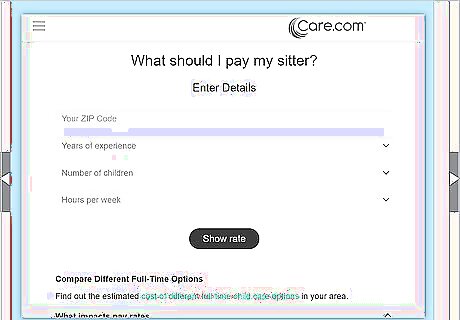
views
Setting a Base Rate

Ask other babysitters you know what they charge. Always start with market research: what are other professionals in your area charging for a similar service or skill? If you know anybody else who babysits, ask them what they charge. Once you have multiple opinions, you can see what the average is. Since they live in your area, they’ll know what a reasonable rate is for where you live. Different areas have very different rates, depending on what people’s average income is. Ask a fellow babysitter, “I’m a new babysitter and am trying to figure out what to charge. I was wondering how much you charge per hour?” Major cities and their suburbs generally pay higher rates than small towns. In New York City and L.A., sitters charge about $20 an hour, while in Houston and Chicago they charge $15. Once you understand the range of rates, consider how your skill compares. If you are as experienced and skilled as similar professionals in your area, you can charge at the median rate. If you're more skilled or have more training, consider a rate at the higher end.

Use an online rate calculator. The internet has a lot of babysitting rate calculators that allow you to put in your zip code and how many years of babysitting experience you have. It will calculate the average rate. One example is https://www.care.com/babysitting-rates.

Ask parents you know what they pay for babysitters. Ask trusted adults in your area how much they pay their babysitters. This will help you get an idea of how much people are willing to pay. Once you have an idea, propose it to your client, and see if they think it’s fair. Keep in mind that parents will pay more per hour for a qualified nanny than for a teenage babysitter. Parents will also pay differently for full-time babysitting than for occasional nights or weekends.

Look up what the minimum wage is in your area. Too many babysitters settle for less than minimum wage because they’re not sure what it is, or because the job is less official than jobs that require work permits. Counties and cities calculate the minimum wage based on what they think is a fair amount to give someone for an hour of their time, so you should charge at least that. If you’re underage to work at a regular job or are undocumented, you should still ask for the minimum wage. You deserve to be paid fairly.
Increasing Your Base Rate

Increase your rate when you gain experience and qualifications. The more babysitting experience you have, the more skilled and qualified you are. Also, the older you are, the more you can charge. Increase your rate when you pass big milestones like graduating middle school or high school. Charge more if you have extra skills, like CPR certification or camp counselor experience.

Charge more if there are more children. Once you’ve settled on a reasonable base rate, charge more money (maybe 5 dollars more per hour) for each additional child you’re asked to look after. Watching 1 or 2 children is very different from watching 5 children, so make sure you’re comfortable with it before saying yes to the job. Also, consider asking your client if you can bring a co-babysitter along with you for large groups of children. The client should pay both babysitters a reasonable rate for this to be a fair deal.

Charge more for special needs and skills. If the child you’re being asked to watch is an infant who requires constant supervision, diaper changing, and bottles, you can charge more than if you’re watching a 10 year old. If the child has special needs or is particularly rambunctious or difficult to manage, you should also charge more, because you will have specialized skills to take care of them. Offer the price you think is fair considering the amount of physical and emotional energy that goes into caring for that child.

Increase your rate if they ask you to do extra chores. You should feel free to charge more if your client asks you to do household chores like sweeping, mopping, dishes, laundry, grocery shopping, and cooking. You can also charge more if they ask you to care for their pets or help their children with their homework. The more tasks they ask you to do outside of just watching their child, the more you can charge for your hourly rate.

Factor in transportation. If you have to travel a long time to get to your babysitting job, you should charge for your commute. Talk to your client about ways to do this. You can include your commute-time in the amount of time you’re compensated for. Another way is to have your client pay for your gas money or your bus tickets, depending on how you are getting there. If you have to bike or walk to your babysitting job in the dark, make sure you feel safe. Otherwise, you should refuse the job, or ask for different hours. Don’t accept a ride from an unfamiliar babysitting client. It may not be safe.

Ask for more payment for babysitting on holidays. If your client asks you to work on Christmas, Valentine’s Day, New Year’s Eve, or some other special occasion, you should charge more. First of all, you’re giving up having a fun time, and you should only do that for the big bucks. And secondly, the client will be willing to pay more, because it’s hard to find sitters on nights like that. On the other hand, if you’re babysitting in the middle of a Sunday afternoon, you’ll probably get less money than babysitting on a Saturday night, when your clients want to go on a date night.



















Comments
0 comment